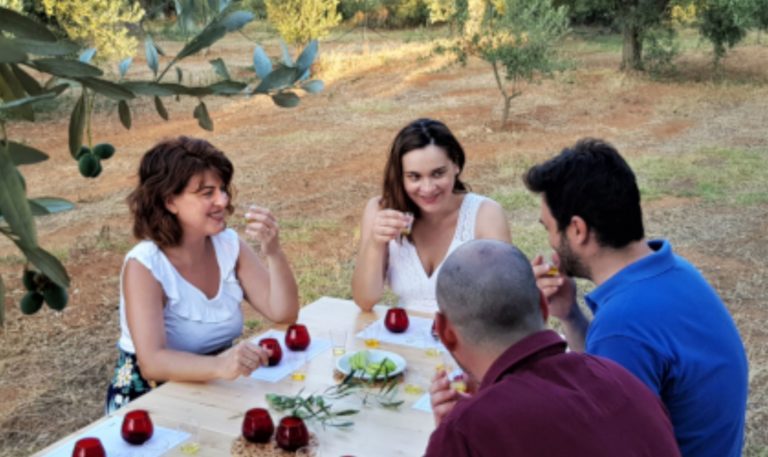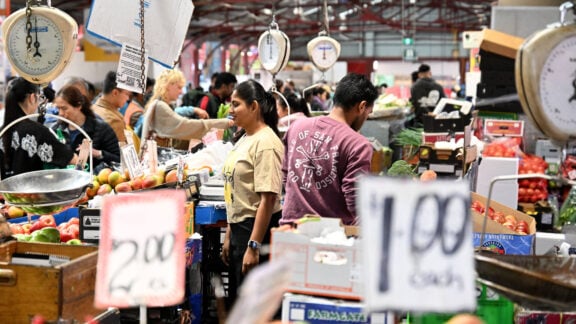Greece’s rich culinary heritage arose from millennia of agricultural tradition. Today, visitors can explore Greek agrotourism and food tourism offerings from Corinth and Mount Pelion to the Cycladic islands. Tourists can choose from olive grove tours, olive oil tastings, farm adventures, cooking lessons, feasts with traditional local cuisine, and more.
An hour’s drive west of Athens takes travellers to Corinth, with its archaeological site and museum, medieval castle, and deep canal. For a taste of rural life over the centuries, visitors can also turn to Oleosophia, producers of Greek extra virgin olive oil (EVOO). Under the Manaki olive trees typical of that area, guests can tour the olive grove, then learn how to appreciate Manaki EVOO’s distinctive flavor in a guided tasting and lesson about the health benefits of olive oil and the Mediterranean diet.
“Oleosophia offers tourists a unique, fun, informative experience as we aim to share knowledge and create long-lasting memories,” as Marianna Devetzoglou explained. The Oleosophia team aims to “create a life changing experience for visitors” by imparting information that enables them to make healthier lifestyle choices, incorporate them into their daily life, and share them with their friends and family. A certified olive oil sommelier, Ms Devetzoglou loves making visitors feel at home as she “creates ambassadors of olive oil everywhere.”
What should they do with that olive oil? Greek cooks have many answers. And “‘it all starts in the kitchen garden.’ We have built our philosophy on this phrase,” said Meletios Andrinos of Karaiskos Farm and the Kritsa Gastronomy Hotel in the village of Portaria on Mount Pelion in eastern Greece. At the farm, visitors can participate in outdoor cooking lessons with a wood-burning oven, “a hands-on experience where guests collect seasonal vegetables from the garden, then cook famous local food in the traditional way.”
READ MORE: Window into world of Greek olive oil celebrates 3rd anniversary
There is the option of relaxing and enjoying dishes inspired by the garden at the restaurant called “Kitchen Garden Minthe” that is overseen by Timoleon Diamantis, Greece’s 2018 Master Chef winner. For those seeking more active engagement, “we like to offer our guests a holistic impression of Pelion,” Mr Andrinos said. “What our land produces, traditional cooking techniques, local recipes and food, the seasonality of our gardening. We like our guests to be involved in the everyday routine on the farm, to feel like locals” and “discover the place through their senses.”
On the Cycladic island of Tinos, Alexander Androvik of Tinos Farm to Table also aims to help visitors become more aware of the environment by encouraging them to eat “straight from the land around them,” enjoying the fresh, seasonal local produce he uses in his traditional slow cooking. For Mr Androvik, “it is all about the connection of nature and raw materials that come from the land to your table, in a gastronomic journey based on Tinian cuisine and products.”
Sometimes Mr Androvik cooks in private residences; at other times, he welcomes guests to his farm. Farm visitors can learn about what he grows, feed the chickens, collect the fresh eggs and produce for their recipes, and then work with him to prepare a traditional meal in his wood-burning oven and on his grill. They prepare the meal outdoors, learn typical Greek recipes, and enjoy their food together.

Although he is an experienced, trained chef, Mr Androvik credits his grandparents for his most important lessons, which started in the fields during his childhood. “When I realised how little we know about where the products come from, how they grow,” Mr Androvik said he was inspired to help people learn more. “I love the philosophy ‘we are what we eat,’ and we shouldn’t lose our roots and our traditions.”
Across the water from Tinos on the more famous neighbouring island of Mykonos, with its cosmopolitan nightlife and celebrity guests, professional olive oil taster, consultant, and gastronomic educator Anita Zachou decided to help tourists focus a few hours of their vacation on a traditional Greek product. At Mykonos Olive Oil Tasting, Ms Zachou takes guests on what she calls “a virtual tour around Greece by tasting awarded olive oils that represent olive varieties from every corner of the country, and experiencing their different aromas and flavors.”
Ms Zachou tells her visitors about “the health benefits of extra virgin olive oil and the Mediterranean Diet, and they indulge in an olive oil and food pairing activity, aiming to understand how different olive oil varieties can completely change the flavor of a culinary creation.” Participants learn about olive oil selection and storage, too. Ms Zachou emphasizes the significance of this knowledge: “olive oil is the most important daily cooking staple, also loaded with many health benefits, making it the tastiest, healthiest condiment in the world.”
Ms Zachou’s mission is for “Greek olive oil to be found in as many kitchens of the world as possible. Olive oil is a blessed product, not only because of its long history, its high nutritional value, its multiple health benefits, its delicious flavor, and the income it offers to thousands of families, but also because it is a product that brings people closer and awakens senses and emotions.” She loves to “accompany visitors from abroad on their journey of discovery of Greek olive oil,” because “creating ambassadors of Greek olive oil worldwide is my lifetime project.”
READ MORE: Olive oil prices vary: Greece offers excellent options
This year at these four Greek agro-food tourism ventures, many of the visitors have been Greek, although others have come from the UK, France, the Balkans, Russia, and the Arab states. All of these businesses offer activities in both English and Greek; Mykonos Olive Oil Tasting sessions are also available in Spanish, while Oleosophia offers French discussions and is planning for Russian.
Most of these activities take place outdoors or in a semi-open space, with careful attention to hygiene and government-mandated protocols, a limited number of participants, and social distancing if more than one family is involved. Of course, those unable to travel this year are most welcome to plan for the future!
Originally published on Greek Liquid Gold: Authentic Extra Virgin Olive Oil (greekliquidgold.com). See that site for recipes with olive oil, photos from Greece, and olive oil news and information.









